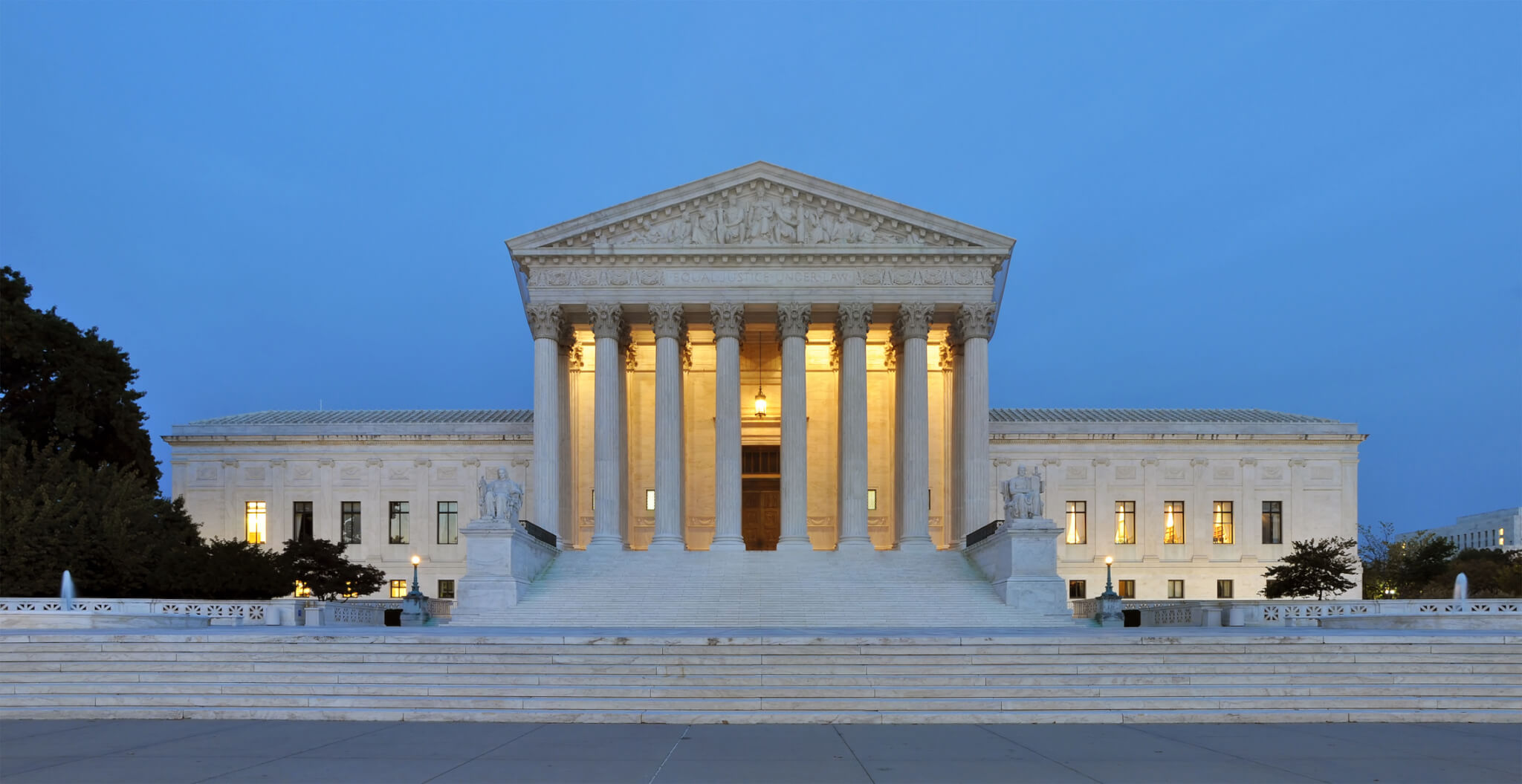
Photo via Wikipedia
In the coming months, the Supreme Court will decide important questions that touch millions of Americans’ lives, and many people aren’t confident it will be for the better.
But the concern goes beyond individuals.
According to Gallup polling, as of 2019, only 38% of Americans have a “great deal” or “quite a lot” of trust and confidence in the Supreme Court. On the other hand, 40% have “some” confidence and 20% have “very little.” These numbers don’t represent historical lows, though.
But maybe people shouldn’t look to the Supreme Court as a resource for all civil rights.
[inline-ad id=”2″]
Briefly, SCOTUS And Civil Rights
That’s the wrong way to think about the Supreme Court and its role in the balance of powers, according to Gabe Roth, executive director of Fix the Court, a national, nonpartisan organization committed to reforming federal courts to make them more transparent and accountable.
Roth pointed out the Supreme Court has a mixed history of supporting civil rights. The same institution that ruled in favor of marriage equality also issued decisions like “separate but equal” that encouraged racial segregation.
He agreed people think of the Supreme Court the wrong way when they put all their hopes in the court upholding their civil rights.
“We want to think that the long arc of history, the arc of the moral universe bends towards justice, but that’s not always the case,” Roth said. “And justice means different things to different people.”
[inline-ad id=”1″]
For example, Roe v. Wade marks a landmark victory for abortion-rights advocates, but it’s seen as a major defeat for those who oppose abortion.
“I think you have to look at the longer history of the court and look that, for a lot of people in our generation, the case that we always think about in terms of the Supreme Court upholding civil rights is Obergefell, but through the long history of the court Obergefell, I think, is an outlier,” he said.
Obergefell v. Hodges was a 2015 case where the Supreme Court ruled that same-sex marriage is protected by the Constitution. It made marriage equality the law of the land.
But the court’s history does suggest a broader bent toward civil rights, according to Mark Kende, a professor at Drake Law School and the director of the Drake Constitutional Law Center.
He said decisions like “separate but equal” are good evidence of the trend because, in 1954, the court overruled that decision with Brown v. Board of Education. It corrected itself again recently when it threw out a 1944 decision that defended the United States’ policy of forcing Japanese-Americans into internment camps.
“The court’s history over 200 years is not very progressive,” Kende said. “But it is sort of the place where racial minorities — people who are vulnerable, like criminal defendants and women, for example — groups that have a history of being discriminated against, have been able to find some relief and some remedies.”
[inline-ad id=”0″]
He didn’t consider the Supreme Court an engine for regular social change, but said even when it’s been conservative, the court has upheld certain progressive policies, like when it ruled in favor of marriage equality in 2015 and upheld Congress’ enforcement of the Affordable Care Act in 2012.
Kende also pointed out that perceived progress depends on the argument someone supports, and that many cases pit two rights against each other. For example, many LGBTQ rights cases are framed against freedom of religion.
Going Forward
Roth said a Supreme Court term like this, where some civil rights are uncertain, has been coming and could be a new normal.
“I think there are a lot of things that are coming to a head that makes it seem like this term for the Supreme Court is an outlier but, in point of fact, when you look at the long history of the Court, it’s not,” Roth said.
He said it’s one consequence of increased polarization, but it’s also the normal way the Supreme Court swings.
“When you look at the complete picture, you realize there are a lot of ebbs and flows,” he said. “And given the tense nature of the time and given who’s in the White House, we sort of have to pay attention to politics every day, whether we like it or not.”
[inline-ad id=”3″]
And not all questions need to be addressed by the justices.
Twice, New York City has repealed laws — one about gun transportation and one about a ban on LGBTQ conversion therapy — rather than have a case brought to the Supreme Court. That was to avoid a potential ruling against their laws.
In the case of firearms, the strategy didn’t work and arguments for that case will be heard in December.
“I think it makes a lot of sense,” Roth said. “Cities and states have to do what they can to reflect the political customs of the day. There’s a lot of gamesmanship going on right now at the state and local level based on which five justices you have at the Supreme Court.”
While he said that isn’t the ideal, Roth acknowledged it’s hard to believe Republicans wouldn’t be doing the same if there was a liberal majority on the Supreme Court.
The idea that the Supreme Court is responsible for upholding rights, according to both Roth and Kende, comes from the fact Congress has become so gridlocked.
Several bills have passed the House of Representatives that would advance civil rights. For example, the For the People Act [H.R. 1], would protect and expand voting rights, while the Equality Act would explicitly protect workers on the basis of sexual orientation and gender identity.
Reason To Hope
Though the federal courts as a whole have become more conservative and public opinion is low, Kende said the situation isn’t catastrophic.
“People still view the Supreme Court as a place where a final decision will be made and hopefully their civil rights will be vindicated,” he said. “There’s perhaps a sort of feeling that the court is at least there to kind of be the ultimate umpire, in that it’s not going to be the umpire solely based on politics, but there will be an attempt to interpret the law fairly.”
It’s not much comfort to people who could lose their jobs because they belong to the LGBTQ community, but history does show that the court can uphold civil rights, and that the court tends to correct its mistakes.
By Nikoel Hytrek
Posted 10/15/19
Politics

Biden marks Earth Day by announcing $7 billion in solar grants
The Biden administration on Monday announced the recipients of its Solar For All Program, a $7 billion climate program that aims to lower energy...

6 terrifying things that could happen if the Comstock Act is used to target abortion
Does 1873 sound like a really, really long time ago? Well, that’s because it is—but if Republicans and far-right anti-abortion activists have their...
Local News

No more Kum & Go? New owner Maverik of Utah retiring famous brand
Will Kum & Go have come and gone by next year? One new report claims that's the plan by the store's new owners. The Iowa-based convenience store...

Here’s a recap of the biggest headlines Iowa celebs made In 2023
For these famous Iowans, 2023 was a year of controversy, career highlights, and full-circle moments. Here’s how 2023 went for the following Iowans:...





